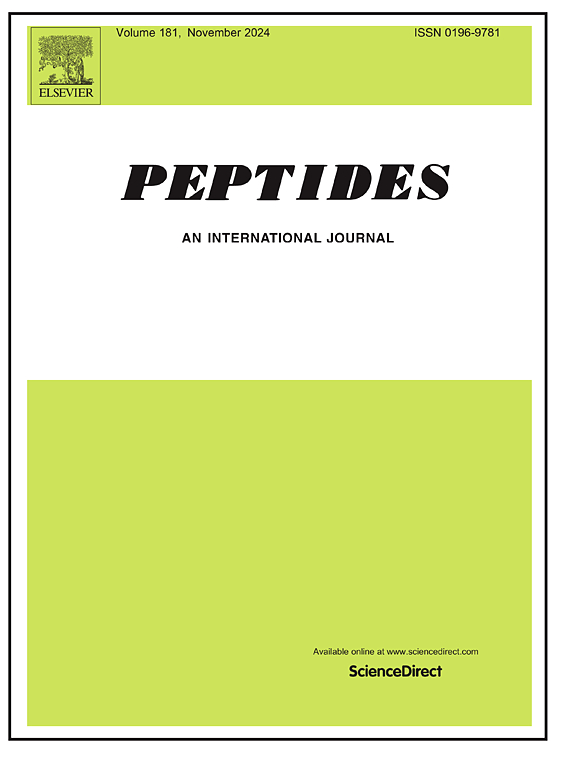Phoenixin-14 ameliorates acetic acid-induced ulcerative colitis in rats via antioxidant, anti-inflammatory and anti-apoptotic mechanisms
IF 2.9
4区 医学
Q3 BIOCHEMISTRY & MOLECULAR BIOLOGY
引用次数: 0
Abstract
Phoenixin (PNX), first discovered in the rat hypothalamus, was initially identified as a reproductive peptide. PNX-14 (14 amino acid isoform) has also been shown to function in cardiovascular regulation, neuroprotection, glucose metabolism, appetite, anxiety, and memory. We aimed to investigate the potential therapeutic role of PNX-14 in acetic acid (AA)-induced ulcerative colitis. Rats were given intrarectally 1 ml saline (control) or 5 % AA (colitis groups). The control group was treated intraperitoneally with saline, while the colitis groups were treated intraperitoneally with saline or PNX-14 (50 μg/kg/d) or gonadotrophin-releasing hormone (GnRH)-antagonist cetrorelix (CTX; 100 µg/kg/d) or CTX and PNX-14 or sulfasalazine as a positive control (100 mg/kg/d) instantly and once a day for 3 days following colitis induction. Colonic samples were evaluated histologically and biochemically [malondialdehyde (MDA), glutathione (GSH), myeloperoxidase (MPO), chemiluminescence (CL), pro-inflammatory cytokines (tumor necrosis factor-α, interferon-γ, interleukin (IL)-1β, IL-6, IL-8), caspase-3, and 8-hydroxy-2’-deoxyguanosine (8-OHdG) measurements] on the 3rd day. Elevated damage scores (macroscopic and microscopic), MPO, MDA, caspase-3, cytokines, and CL values, and decreased GSH levels of the colitis group were reversed by PNX-14 treatment (p < 0.05–0.001). CTX or CTX plus PNX-14 reduced damage scores, caspase-3, 8-OHdG, cytokines, and CL values (p < 0.05–0.001). Sulfasalazine treatment improved all parameters except MDA and GSH. PNX-14, which alleviates macroscopic, histological and biochemical parameters, can be considered as a potential therapeutic agent in ulcerative colitis with its anti-inflammatory, antioxidant and anti-apoptotic actions. Furthermore, despite its effects as an GnRH-antagonist, CTX has also revealed a similar beneficial role as PNX-14 in this ulcerative colitis model.
凤凰素-14通过抗氧化、抗炎和抗凋亡机制改善醋酸诱导的大鼠溃疡性结肠炎
凤凰素(Phoenixin, PNX)最早发现于大鼠下丘脑,是一种生殖肽。PNX-14(14个氨基酸异构体)也被证明在心血管调节、神经保护、葡萄糖代谢、食欲、焦虑和记忆中起作用。我们的目的是研究PNX-14在醋酸(AA)诱导的溃疡性结肠炎中的潜在治疗作用。大鼠直肠内注射1 ml生理盐水(对照组)或5 % AA(结肠炎组)。对照组腹腔注射生理盐水,结肠炎组腹腔注射生理盐水或PNX-14 (50 μg/kg/d)或促性腺激素释放激素(GnRH)拮抗剂cetrorelix (CTX;100 µg/kg/d)或CTX和PNX-14或柳氮磺胺吡啶作为阳性对照(100 mg/kg/d),在结肠炎诱导后立即,每天1次,连续3天。在第3天对结肠样本进行组织学和生化评价[丙二醛(MDA)、谷胱甘肽(GSH)、髓过氧化物酶(MPO)、化学发光(CL)、促炎细胞因子(肿瘤坏死因子-α、干扰素-γ、白细胞介素(IL)-1β、IL-6、IL-8)、半胱天冬酶-3和8-羟基-2′-脱氧鸟苷(8-OHdG)测定]。PNX-14治疗可逆转结肠炎组损伤评分(宏观和微观)、MPO、MDA、caspase-3、细胞因子和CL值升高以及GSH水平降低(p <; 0.05-0.001)。CTX或CTX加PNX-14可降低损伤评分、caspase- 3,8 - ohdg、细胞因子和CL值(p <; 0.05-0.001)。除丙二醛(MDA)和谷胱甘肽(GSH)外,磺胺吡啶处理改善了所有参数。PNX-14具有抗炎、抗氧化、抗凋亡等作用,可作为治疗溃疡性结肠炎的潜在药物。此外,尽管CTX具有gnrh拮抗剂的作用,但在溃疡性结肠炎模型中,CTX也显示出与PNX-14相似的有益作用。
本文章由计算机程序翻译,如有差异,请以英文原文为准。
求助全文
约1分钟内获得全文
求助全文
来源期刊

Peptides
医学-生化与分子生物学
CiteScore
6.40
自引率
6.70%
发文量
130
审稿时长
28 days
期刊介绍:
Peptides is an international journal presenting original contributions on the biochemistry, physiology and pharmacology of biological active peptides, as well as their functions that relate to gastroenterology, endocrinology, and behavioral effects.
Peptides emphasizes all aspects of high profile peptide research in mammals and non-mammalian vertebrates. Special consideration can be given to plants and invertebrates. Submission of articles with clinical relevance is particularly encouraged.
 求助内容:
求助内容: 应助结果提醒方式:
应助结果提醒方式:


